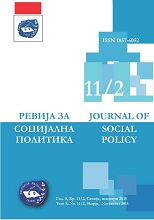Inclusion of disabled persons in the Republic of Macedonia: Social protection and employment policies
Inclusion of disabled persons in the Republic of Macedonia: Social protection and employment policies
Author(s): Svetlana Trbojević, Natasha BogoevskaSubject(s): Civil Society, Governance, Social development, Economic development, Human Resources in Economy, Socio-Economic Research
Published by: Филозофскиот факултет во Скопје
Keywords: disabled persons; social policy; social protection; protected employment; inclusive labor market;
Summary/Abstract: Social protection is determined as an activity of public interest. The state implements the social protection of citizens in accordance with the principle of social justice. The social protection is defined as a system of measures; activities and policies for prevention and overcoming the basic social risks to which the citizen is exposed throughout life, for reducing poverty and social exclusion and for strengthening citizen’s capacity for self protection. Social protection system in the Republic of Macedonia encompasses a wide range of vulnerable groups within the contributory insurance schemes and noncontributory welfare protection. The contributory part encompasses pension and disability insurance, health insurance and unemployment insurance and non-contributory or tax financed part of the system is composed of financial benefits and social services. Traditionally, disabled persons had a special treatment in the process of development and implementation of social policy measures in the Republic of Macedonia. As a part of former Yugoslavia, Macedonia had a long history of inclusion of disabled persons in the labor market. The devastating political and economic transition, following the country’s independence in the early 1990s, jeopardized the gained position of disabled persons in the labor market. Generally, a large segment of state owned capital was either downsized or closed due to bankruptcy which reflected in the rapid growth of unemployment rate among vulnerable groups. Consequently, the state undertook number of noncontributory welfare measures to soften the negative effects from the economic distress. Gradually, the focus was shift from passive to active labor measures: job placement services, benefit administration, and labour market programmes such as training and job creation. This article presents an overview of the political, legislative and practical efforts for development of an inclusive labor market in the Republic of Macedonia. In that regard the article will elaborate: the position of disabled persons in Macedonian society; employment policies and social protection measures targeting disabled persons; challenges and obstacles in the implementation of the national strategic goals for development of active labour market.
Journal: Ревија за социјална политика
- Issue Year: 2015
- Issue No: 11/2
- Page Range: 403-422
- Page Count: 20
- Language: English

